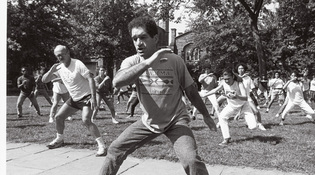 loading
loading
Professor of mambo Michael MarslandFollowing the lead of instructor Jelon Vieira in capoeira, an Afro-Brazilian marital art, at a 1990 session of his course New York Mambo. View full imageBorn in 1932, Thompson grew up middle class in El Paso, son of a doctor (his father) and an influential figure in the city’s arts community (his mother). “I loved to cross the Rio Bravo, what we call the Rio Grande, e inmediatamente la diferencia se ve, everything changes. I love cultural difference. I don’t know where that came from.” During school vacation in March 1950, his parents took him and his younger sister to Mexico City. On the first day, Thompson went walking on his own. He happened on a large plaza bordered by a majestic building and asked a guard what it was. “‘El Palacio Nacional. And if you hurry in there, you can see him.’ And I thought ‘Wow! See who?’ On a high scaffolding, there was Diego Rivera directing his assistants, indicating to his left and to his right with his brush, just like an orchestra leader” as the assistants helped him paint a mural. That evening, in the hotel dining room, “I heard this bee-DEEM-brakata, extraordinary offbeat music. I asked the waitress, What’s that? She said mambo.” On that day, says Thompson, “My life changed. Mambo irradiated me with classical Afro-Atlantic music, and there was no turning back.” For Thompson, to study Afro-Atlantic music—and body language, visual arts, and dance—is also to study Afro-Atlantic philosophy. Petra Richterova ’10PhD, one of his graduate students, explains: “In the West, Africa is seen as not having a philosophy, because what we see as philosophy is primarily text-based. In the Afro-Atlantic world, however, existential quandaries tend to be embodied in the language of gesture, dance, music, and fashion.” To understand Afro-Atlantic values and beliefs, “we have to become literate in this nonverbal language. If you want to know Afro-Atlantic philosophy, go to a Miles Davis concert.” Thompson talks about that philosophy in class, offering admonitions (“You only live once! Heart attack! Boom! Enjoy the feast of life. Treasure it. Be worthy of it”) as well as “ways to right living.” Among them: staying “cool”; practicing generosity; and showing respect without regard for social status. Cool is self-possession, composure, discretion, silence. Thompson has found terms in 35 African languages for what he describes as “that divine spark of equilibrium in the soul.” Second, generosity: don’t be a Tyrannosaurus rex, with arms too short to reach the wallet and pay for a round of drinks. Third, recognize that “the people you snub because they look small on your way up are the people you are going to meet on the way down. You can’t afford to snub anyone.”
|
|